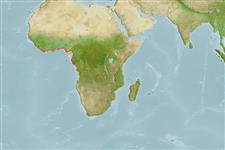Teleostei (teleosts) >
Eupercaria/misc (Various families in series Eupercaria) >
Lutjanidae (Snappers) > Lutjaninae
Etymology: Lutjanus: Malay, ikan lutjan, name of a fish.
More on author: Duméril.
Environment: milieu / climate zone / depth range / distribution range
Ecology
Marine; brackish; reef-associated. Tropical; 7°N - 20°S, 15°W - 15°E (Ref. 55)
Eastern Atlantic: west coast of Africa (Ref. 57393), from Senegal to Angola (Ref. 81653), primarily in the Gulf of Guinea (Ref. 55, 57393, 81653), rarely appearing in Senegal (Ref. 57393). Mesoprion retrospinis Valenciennes, 1830 may be the oldest name for this species as the original description agrees closely to that given by Delais, 1952.
Size / Weight / Age
Maturity: Lm ? range ? - ? cm
Max length : 150 cm TL male/unsexed; (Ref. 81653); common length : 50.0 cm TL male/unsexed; (Ref. 55); max. published weight: 50.0 kg (Ref. 4320)
Dorsal spines (total): 10; Dorsal soft rays (total): 13 - 14; Anal spines: 3; Anal soft rays: 8. Diagnosis: body relatively deep (Ref. 81653). Head conical (Ref. 57393), slightly rounded, its dorsal profile curving gently (Ref. 55, 57393, 81653). Snout somewhat blunt (Ref. 57393, 81653). Preorbital/lachrymal bone broad (Ref. 55, 81653). Lips thick (Ref. 55, 57393, 81653). Vomerine tooth patch chevron-shaped in young individuals and triangular with a short postero-median prolongation in adults (Ref. 57393, 81653). Maxilla extending to about mid-eye level or beyond; preopercular notch and knob weak (Ref. 55, 81653). Pectoral fins of adult not reaching
level of anus (Ref. 81653). Scales moderate-sized (Ref. 57393, 81653). Scale rows on back rising obliquely above lateral line (Ref. 55, 57393, 81653). 4-5 scale rows above lateral line and below middle of spinous part of dorsal fin (Ref. 57393, 81653). 9-10 (transverse) scale rows on cheek (Ref. 55, 57393, 81653). Smokey gray on back and upper sides grading to whitish pink on lower sides and belly; sides of juveniles with a series of alternating light and dark bars of about equal widths (Ref. 55, 57393, 81653).
Adults inhabit rocky bottoms and coral reefs (Ref. 55, 57393, 81653). Also common in brackish lagoons and occasionally in rivers (Ref. 55, 81653), especially juveniles (Ref. 57393). Feed on fishes and crustaceans (Ref. 55, 81653).
Life cycle and mating behavior
Maturity | Reproduction | Spawning | Eggs | Fecundity | Larvae
Allen, G.R., 1985. FAO Species Catalogue. Vol. 6. Snappers of the world. An annotated and illustrated catalogue of lutjanid species known to date. FAO Fish. Synop. 125(6):208 p. Rome: FAO. (Ref. 55)
IUCN Red List Status (Ref. 130435: Version 2024-2)
Threat to humans
Harmless
Human uses
Fisheries: subsistence fisheries; gamefish: yes
Tools
Special reports
Download XML
Internet sources
Estimates based on models
Preferred temperature (Ref.
123201): 22.9 - 28, mean 27.4 °C (based on 26 cells).
Phylogenetic diversity index (Ref.
82804): PD
50 = 0.5000 [Uniqueness, from 0.5 = low to 2.0 = high].
Bayesian length-weight: a=0.01585 (0.00906 - 0.02774), b=2.96 (2.82 - 3.10), in cm total length, based on LWR estimates for this species & Genus-body shape (Ref.
93245).
Trophic level (Ref.
69278): 4.0 ±0.66 se; based on food items.
Resilience (Ref.
120179): Very Low, minimum population doubling time more than 14 years (Preliminary K or Fecundity.).
Fishing Vulnerability (Ref.
59153): Very high vulnerability (90 of 100).
Nutrients (Ref.
124155): Calcium = 15.4 [9.4, 23.2] mg/100g; Iron = 0.243 [0.153, 0.382] mg/100g; Protein = 18.9 [17.4, 20.2] %; Omega3 = 0.119 [0.083, 0.170] g/100g; Selenium = 81.1 [50.6, 127.9] μg/100g; VitaminA = 82 [15, 303] μg/100g; Zinc = 0.4 [0.3, 0.5] mg/100g (wet weight);
